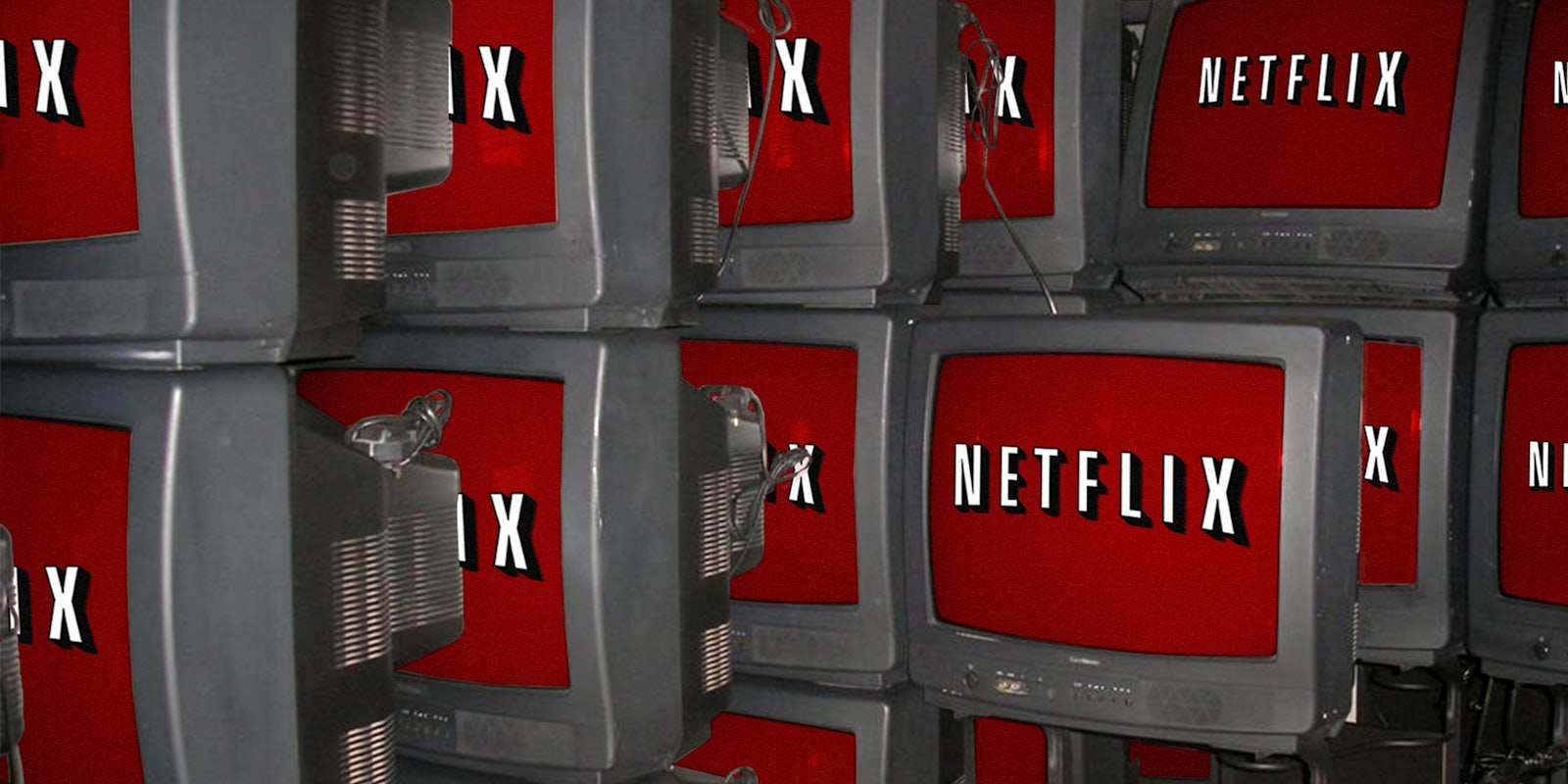When a federal judge for the U.S. Court of Appeals struck down the FCC’s net neutrality doctrine earlier this month, Netflix turned hat-in-hand to its user-base.
The ruling essentially allows Internet service providers (ISP) to discriminate how much bandwidth they provide to any site they please, and Netflix—which is responsible for nearly 30 percent of Internet traffic in the U.S.—makes for a prime target. Providing HD video to its 29 million U.S. subscribers (that’s 1 million more subscribers than HBO has) is a heavy load on ISPs, and firms like Verizon, Comcast, and Time Warner have been eager to monetize those extra bandwidth demands. Equally important, the popularity of streaming sites like Netflix and Hulu Plus has spurred a rise in cord-cutters—those ditching cable TV in favor of mobile media.
Last week, Verizon was accused go slowing down users’ load time for cloud storage sites, a practice known as “throttling.” (The company staunchly denied the allegations.)
In the past, the FCC has strongly pushed against such actions. In 2008, the FCC forced Comcast to treat BitTorrent, the peer-to-peer network, like any other Internet site after the telecom finally copped to throttling traffic.
The recent ruling signals a stark change of direction.
Netflix CEO Reed Hastings, in an official statement after the ruling, seemed more tempered than ired. “In principle,” Hastings said, “a domestic ISP now can legally impede the video streams that members request from Netflix, degrading the experience we jointly provide. The motivation could be to get Netflix to pay fees to stop this degradation.”
Hastings is trying to be optimistic. He believes “ISPs will avoid this consumer-unfriendly path of discrimination” and “are generally aware of the broad public support for net neutrality and don’t want to galvanize government action.”
That said, no one ever went broke betting on the greed of American ISPs.
And what happens if they do follow what Hastings calls a “draconian scenario”? Netflix is counting on you, the Netflix user, to stand up and fight: “We would vigorously protest and encourage our members to demand the open Internet they are paying their ISP to deliver.”
While on a surface level, one can imagine a scene of Netflix users boycotting certain Internet providers—switching from an ISP that throttles to one that doesn’t—that’s not really an option in most of the country. ISPs hold a virtual monopoly in most of their markets, and in others you’re option is to switch from one big player to another. It’s a bit like protesting McDonald’s low worker wages by going to Burger King instead.
By ending net neutrality, Verizon and Comcast can use their lion’s share of the broadband market to trap consumers. In all likelihood, if Netflix doesn’t pay the still-hypothetical fee for its high-bandwidth needs, customers could likely just blame Netflix for decreased service unless a new, net-neutral option shows up in their neighborhood—perhaps a certain search engine.
Netflix is not without a plan, however, and it’s hidden in the new subscription options pondered earlier this month in an earnings interview. The streaming sites hopes to create “tiered” streaming plans for customers. Last December, Netflix unveiled a $6.99/month plan that allows streaming on only one screen and only in standard definition (SD). That’s different from the two-screen HD option, which is $7.99, and a premium family deal of four screens at a time for $11.99. The idea is to get new customers in at the bargain rate in the hope they’ll be enticed to step up to the standard or premium rate.
Netflix doesn’t just need a new customer base; it needs an army. Growing its subscription numbers is good in general for Netflix, true, but with net neutrality gone and talk of “protests” in official statements, Netflix doesn’t just need you for your money. If basic behavioral psychology proves true, the number of Netflix users will not only grow with these plans but the vast majority will settle in on the HD plan (the concept being customers don’t like to be cheap but they do like to get a deal).
If any ISP makes it common practice to cap the loading of HD content from Netflix, the backlash could be severe—and it’ll have to be. ISPs are generally used to being hated by just about everyone, and convincing them to stop committing a profitable act like throttling would take a drastic change in tone.
Netflix users are also not as active in the digital sphere as users of other websites. Wikipedia is a community and, as such, led a successful protest of the Stop Online Piracy Act (SOPA) back in 2012. The long, wayward arm of the law that is Reddit can quickly mobilize action against any number of targets. Even the aforementioned BitTorrent complaints were driven by that service’s devoted, tech-savvy user-base. Netflix—when compared to these more typical online communities—is by its very nature a passive experience, one that does not breed the loyalty of Wikipedia editors or redditors. After all, Netflix has zero user-generated content.
Fear not: In all likelihood, Netflix has very deep pockets and will likely pay any fee levied against it (estimated to likely be between $75-$100 million) to ensure users get a consistent service. A solution could possibly even come from Democrats in Congress who just unveiled the Open Internet Preservation Act, which would reinstate the net neutrality doctrine.
The real danger is for smaller high-bandwidth services (Steam and Spotify come to mind), and whether they can afford to fork over the money to ISPs. And if Netflix’s options seem sparse, even desperate, that’s only a reflection of how damaging this court’s decision could be for every digital citizen.
Photo via Elsie esq/Flickr (CC BY 2.0) | Remix by Jason Reed


